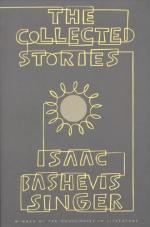|
This section contains 2,144 words (approx. 8 pages at 300 words per page) |

|
SOURCE: Levine, Herschel. “The Sisterhood of Hedda and Yentl.” Evolutionary Psychology 12, no. 1-2 (1991): 105-09.
In the following essay, Levin compares the character of Yentl from Singer's short story “Yentl the Yeshiva Boy” to the character of Hedda Gabler in Henrik Ibsen's play Hedda Gabler.
On the surface, Hedda,1 Ibsen's gun-toting aristocratic protagonist, is the polar opposite of I. B. Singer's Yentl2 [in “Yentl the Yeshiva Boy”], the lower middle class Jewess, whose greatest ambition is to study Torah i.e., Jewish Law on an equal footing with Jewish males. Deeper examination of the personality of each, however, reveals basic affinities the two share.
Both lack a positive female role model; Hedda's mother is never mentioned in Ibsen's play, while Yentl's mother died at an early age. Hence, they seek to identify with their respective fathers. Like her military male parent, Hedda loves guns, which serve as a central...
|
This section contains 2,144 words (approx. 8 pages at 300 words per page) |

|


